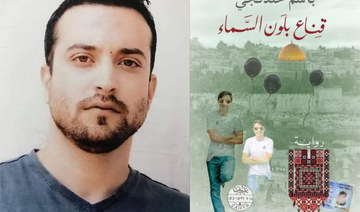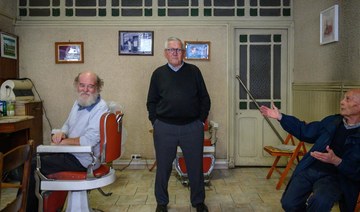TOKYO: Japanese women who say “Me too” do so at their own risk.
Online comments accused Rika Shiiki of lying and being a publicity hound when she tweeted that she lost business contracts after refusing to have sex with clients. Some said that by agreeing to dine with a man, she led him on.
“The comments I received were disproportionately negative,” the 20-year-old university student and entrepreneur told a TV talk show in December. “We need to create a society where we can speak up. Otherwise sexual harassment and other misconduct will persist forever.”
The #MeToo movement has not caught on in Japan, where speaking out often draws criticism rather than sympathy, even from other women.
In a patriarchal society where women have long taken the blame, many victims try to forget attacks and harassment instead of seeking support and justice, said Mari Miura, a political science professor at Sophia University in Tokyo.
“Japan lacks such a sisterhood,” she said. “It’s an exhausting and intimidating process. ... It’s quite natural that victims feel reluctant to speak up.”
One woman, journalist Shiori Ito, went public last year. She held a news conference after prosecutors decided not to press charges against a prominent TV newsman whom she had accused of raping her after he invited her to discuss job opportunities over dinner and drinks in 2015.
Many online comments criticized her for speaking out, looking too seductive and ruining the life of a prominent figure. Some women called her an embarrassment, she told The Associated Press.
The October release of Ito’s book “Blackbox” detailing her ordeal came as the #MeToo phenomenon was making headlines in America. It prompted some discussion in Japan, but only a handful of other women came forward.
“Many people think Shiori’s problem has nothing to do with them ... and that’s why #MeToo isn’t growing in Japan,” said lawyer Yukiko Tsunoda, an expert on sex crimes. In Japan, sexually assaulted women are traditionally called “the flawed,” she said.
Nearly three quarters of rape victims said they had never told anyone, and just over 4 percent had gone to police, according to a 2015 government survey. The study found that one in 15 Japanese women had been raped or forced to have sex.
Victims often shy away from going to court out of fear, privacy concerns or losing jobs, Tsunoda said.
Justice Ministry statistics show only one-third of rape cases go to court, and punishment is not severe. Of the 1,678 people tried for sexual assault in 2017, only 285, or 17 percent, were sentenced to prison for three years or longer. In November, Yokohama prosecutors, without saying why, dropped the case against six students from a leading university who had been arrested for the alleged gang-rape of a teenage female student after getting her drunk. The university expelled three of them.
Popular writer Haruka Ito, who goes by the pen name Ha-Chu, was criticized after revealing in December that she had faced sexual and other harassment by a senior male employee when both worked at Dentsu, Japan’s largest advertising agency.
The alleged harasser, whom she identified by name, apologized in a statement and quit as head of his own company, though he denied the harassment was sexual.
Ha-chu said in a statement that she initially tried to endure and forget the ordeal, fearing that exposing it would hurt her image and cause problems for her former colleagues. After news of the journalist Ito’s case and the #MeToo movement, “I decided to speak out,” she said.
Conformist pressure in Japan discourages women from speaking out or saying “no” to many things, including unwanted sex, said Saori Ikeuchi, a former lawmaker and gender diversity activist.
That mindset has silenced virtually all of Japan’s so-called “comfort women,” who were sexually abused as prostitutes for the wartime military, while Japan has shown little sympathy to victims from Korea and elsewhere, she said.
Ito, the journalist, said that after she became dizzy and passed out in a restroom, her alleged attacker, Noriyuki Yamaguchi, took her to his hotel room and raped her while she was incapacitated.
The alleged assault was just the beginning of her ordeal, Ito said. The women’s clinic she visited the next day lacked expertise on rape, and a rape victim support center refused to give her advice on the phone. Police required her to recount the ordeal repeatedly and to demonstrate it with a life-sized doll, she said.
Ito said it took three weeks to get police to accept her criminal complaint and start investigating. She held a news conference in May, announcing that she had requested a court-appointed citizens’ panel to review the decision to drop the case. The inquest in September agreed with the decision not to indict.
Yamaguchi has denied any wrongdoing in published articles and on Facebook. Ito has filed a civil lawsuit against him, demanding 10 million yen ($93,000) in compensation for her suffering from the alleged rape, and seeking any clues as to why he was let go and never arrested.
“I thought about how I could change the situation, and I had no choice but to speak out about my experience,” she said.
A group of opposition lawmakers has started its own investigation, seeking to find if the charges were dropped because of Yamaguchi’s connections to powerful political officials.
National Police Agency official Junichiro Kan told the lawmakers at a recent hearing that Ito’s case was properly handled. Police say they have tried to be more sensitive to the feelings of victims while guarding against wrongful accusations.
Mika Kobayashi, a rape victim, runs a self-help group that has exchanged thousands of #MeToo experiences, but only anonymously among themselves.
She said she was pushed into a car and raped on her way home in 2000. She reported the attack to police, but the attacker hasn’t been found. She has since published books about her recovery from the ordeal, to raise public awareness.
Her focus is on providing support and understanding for victims, rather than being an activist.
“I used to think of myself as someone hiding a big secret, a sex assault victim and unclean,” she said. “I’m so grateful I could connect with fellow victims. They gave me strength.”
The knowledge that others also blamed themselves and lost self-esteem has helped her to heal slowly, Kobayashi said.
“I think it’s also OK not to speak up,” she said. “I respect any decision that makes a victim feel most comfortable.”
Saying ‘Me Too’ in Japan has risk of being bashed, ignored
Saying ‘Me Too’ in Japan has risk of being bashed, ignored

A 98-year-old in Ukraine walked miles to safety from Russians, with slippers and a cane
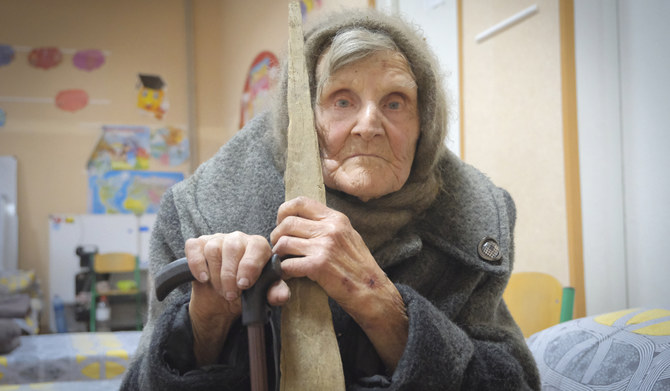
- Describing her journey, the nonagenarian said she had fallen twice and was forced to stop to rest at some points, even sleeping along the way before waking up and continuing her journey
KYIV, Ukraine: A 98-year-old woman in Ukraine who escaped Russian-occupied territory by walking almost 10 kilometers (6 miles) alone, wearing a pair of slippers and supported by a cane has been reunited with her family days after they were separated while fleeing to safety.
Lidia Stepanivna Lomikovska and her family decided to leave the frontline town of Ocheretyne, in the eastern Donetsk region, last week after Russian troops entered it and fighting intensified.
Russians have been advancing in the area, pounding Kyiv’s depleted, ammunition-deprived forces with artillery, drones and bombs.
“I woke up surrounded by shooting all around — so scary,” Lomikovska said in a video interview posted by the National Police of Donetsk region.
In the chaos of the departure, Lomikovska became separated from her son and two daughters-in-law, including one, Olha Lomikovska, injured by shrapnel days earlier. The younger family members took to back routes, but Lydia wanted to stay on the main road.
With a cane in one hand and steadying herself using a splintered piece of wood in the other, the pensioner walked all day without food and water to reach Ukrainian lines.
Describing her journey, the nonagenarian said she had fallen twice and was forced to stop to rest at some points, even sleeping along the way before waking up and continuing her journey.
“Once I lost balance and fell into weeds. I fell asleep … a little, and continued walking. And then, for the second time, again, I fell. But then I got up and thought to myself: “I need to keep walking, bit by bit,’” Lomikovska said.
Pavlo Diachenko, acting spokesman for the National Police of Ukraine in the Donetsk region, said Lomikovska was saved when Ukrainian soldiers spotted her walking along the road in the evening. They handed her over to the “White Angels,” a police group that evacuates citizens living on the front line, who then took her to a shelter for evacuees and contacted her relatives.
“I survived that war,’ she said referring to World War II. “I had to go through this war too, and in the end, I am left with nothing.
“That war wasn’t like this one. I saw that war. Not a single house burned down. But now – everything is on fire,” she said to her rescuer.
In the latest twist to the story, the chief executive of one of Ukraine’s largest banks announced on his Telegram channel Tuesday that the bank would purchase a house for the pensioner.
“Monobank will buy Lydia Stepanivna a house and she will surely live in it until the moment when this abomination disappears from our land,” Oleh Horokhovskyi said.
Amazon Purr-rime: Cat accidentally shipped to online retailer

- Galena was found safe by a warehouse worker at an Amazon center after vanishing from her home in Utah
LOS ANGELES: A curious cat that sneaked into an open box was shipped across the United States to an Amazon warehouse after its unknowing owners sealed it inside.
Carrie Clark’s pet, Galena, vanished from her Utah home on April 10, sparking a furious search that involved plastering “missing” posters around the neighborhood.
But a week later, a vet hundreds of miles (kilometers) away in Los Angeles got in touch to say the cat had been discovered in a box — alongside several pairs of boots — by a warehouse worker at an Amazon center.
“I ran to tell my husband that Galena was found and we broke down upon realizing that she must have jumped into an oversized box that we shipped out the previous Wednesday,” Clark told KSL TV in Salt Lake City.
“The box was a ‘try before you buy,’ and filled with steel-toed work boots.”
Clark and her husband jetted to Los Angeles, where they discovered Amazon employee Brandy Hunter had rescued Galena — a little hungry and thirsty after six days in a cardboard box, but otherwise unharmed.
“I could tell she belonged to someone by the way she was behaving,” said Hunter, according to Amazon.
“I took her home that night and went to the vet the next day to have her checked for a microchip, and the rest is history.”
What did people eat before agriculture? New study offers insight
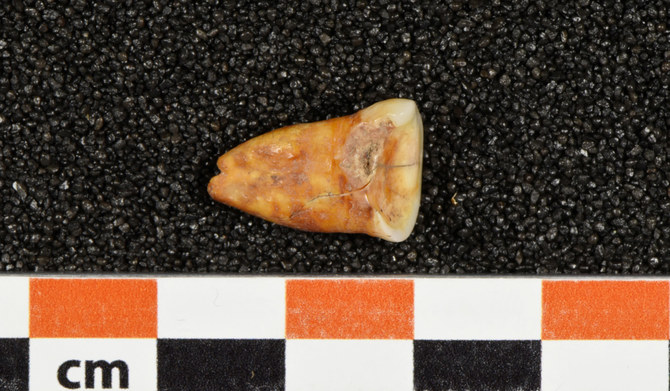
- Analysis of forms — or isotopes — of elements including carbon, nitrogen, zinc, sulfur and strontium in these remains indicated the type and amount of plants and meat they ate
WASHINGTON: The advent of agriculture roughly 11,500 years ago in the Middle East was a milestone for humankind — a revolution in diet and lifestyle that moved beyond the way hunter-gatherers had existed since Homo sapiens arose more than 300,000 years ago in Africa.
While the scarcity of well-preserved human remains from the period preceding this turning point has made the diet of pre-agricultural people a bit of a mystery, new research is now providing insight into this question. Scientists reconstructed the dietary practices of one such culture from North Africa, surprisingly documenting a heavily plant-based diet.
The researchers examined chemical signatures in bones and teeth from the remains of seven people, as well as various isolated teeth, from about 15,000 years ago found in a cave outside the village of Taforalt in northeastern Morocco. The people were part of what is called the Iberomaurusian culture.
Analysis of forms — or isotopes — of elements including carbon, nitrogen, zinc, sulfur and strontium in these remains indicated the type and amount of plants and meat they ate. Found at the site were remains from different edible wild plants including sweet acorns, pine nuts, pistachio, oats and legumes called pulses. The main prey, based on bones discovered at the cave, was a species called Barbary sheep.
“The prevailing notion has been that hunter-gatherers’ diets were primarily composed of animal proteins. However, the evidence from Taforalt demonstrates that plants constituted a big part of the hunter-gatherers’ menu,” said Zineb Moubtahij, a doctoral student in archaeology at the Max Planck Institute for Evolutionary Anthropology in Germany and lead author of the study published on Monday in the journal Nature Ecology & Evolution.
“It is important as it suggests that possibly several populations in the world already started to include substantial amount of plants in their diet” in the period before agriculture was developed, added archeogeochemist and study co-author Klervia Jaouen of the French research agency CNRS.
The Iberomaurusians were hunter-gatherers who inhabited parts of Morocco and Libya from around 25,000 to 11,000 years ago. Evidence indicates the cave served as a living space and burial site.
These people used the cave for significant portions of each year, suggesting a lifestyle more sedentary than simply roaming the landscape searching for resources, the researchers said. They exploited wild plants that ripened at different seasons of the year, while their dental cavities illustrated a reliance on starchy botanical species.
Edible plants may have been stored by the hunter-gatherers year-round to guard against seasonal shortages of prey and ensure a regular food supply, the researchers said.
These people ate only wild plants, the researchers found. The Iberomaurusians never developed agriculture, which came relatively late to North Africa.
“Interestingly, our findings showed minimal evidence of seafood or freshwater food consumption among these ancient groups. Additionally, it seems that these humans may have introduced wild plants into the diets of their infants at an earlier stage than previously believed,” Moubtahij said.
“Specifically, we focused on the transition from breastfeeding to solid foods in infants. Breast milk has a unique isotopic signature, distinct from the isotopic composition of solid foods typically consumed by adults.”
Two infants were among the seven people whose remains were studied. By comparing the chemical composition of an infant’s tooth, formed during the breastfeeding period, with the composition of bone tissue, which reflects the diet shortly before death, the researchers discerned changes in the baby’s diet over time. The evidence indicated the introduction of solid foods at around the age of 12 months, with babies weaned earlier than expected for a pre-agricultural society.
North Africa is a key region for studying Homo sapiens evolution and dispersal out of Africa.
“Understanding why some hunter-gatherer groups transitioned to agriculture while others did not can provide valuable insights into the drivers of agricultural innovation and the factors that influenced human societies’ decisions to adopt new subsistence strategies,” Moubtahij said.
Palestinian prisoner in Israel wins top fiction prize
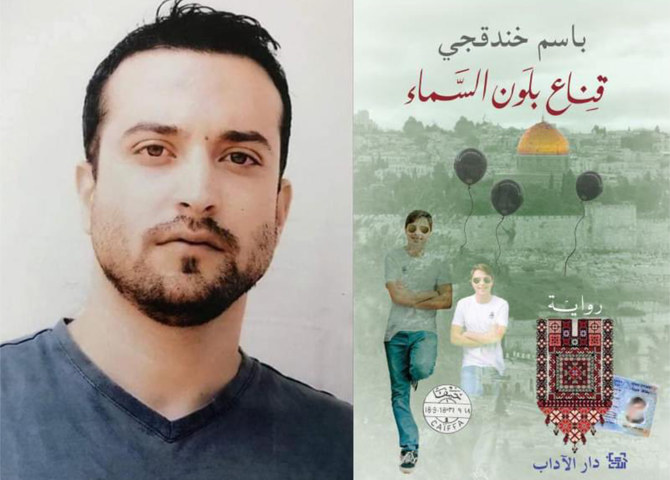
- The mask in the novel’s title refers to the blue identity card that Nur, an archaeologist living in a refugee camp in Ramallah, finds in the pocket of an old coat belonging to an Israeli
ABU DHABI: Palestinian writer Basim Khandaqji, jailed 20 years ago in Israel, won a prestigious prize for Arabic fiction on Sunday for his novel “A Mask, the Color of the Sky.”
The award of the 2024 International Prize for Arabic Fiction was announced at a ceremony in Abu Dhabi.
The prize was accepted on Khandaqji’s behalf by Rana Idriss, owner of Dar Al-Adab, the book’s Lebanon-based publisher.
Khandaqji was born in the Israeli-occupied West Bank city of Nablus in 1983, and wrote short stories until his arrest in 2004 at the age of 21.
He was convicted and jailed on charges relating to a deadly bombing in Tel Aviv, and completed his university education from inside jail via the Internet.
The mask in the novel’s title refers to the blue identity card that Nur, an archaeologist living in a refugee camp in Ramallah, finds in the pocket of an old coat belonging to an Israeli.
Khandaqji’s book was chosen from 133 works submitted to the competition.
Nabil Suleiman, who chaired the jury, said the novel “dissects a complex, bitter reality of family fragmentation, displacement, genocide, and racism.”
Since being jailed Khandaqji has written poetry collections including “Rituals of the First Time” and “The Breath of a Nocturnal Poem.”
He has also written three earlier novels.
Mexican doctor claims victory in $28 Cartier earrings battle

MEXICO CITY: A Mexican man has claimed a victory over French luxury brand Cartier, saying an error allowed him to buy two pairs of earrings for $28 that were supposed to cost nearly $28,000.
After a four-month struggle, doctor Rogelio Villarreal said he had finally received the jewelry, which he accused the company of refusing to deliver after his online purchase in December.
According to Villarreal, he came across the low-priced earrings while browsing Instagram.
“I swear I broke out in a cold sweat,” he wrote on the social media platform X.
Cartier declined to recognize the purchase and offered Villarreal a refund, as well as a bottle of champagne and a passport holder as compensation, according to a company letter shared by the doctor.
But Villarreal refused and decided to take the case to Mexico’s consumer protection agency, which ruled in favor of the doctor.
Cartier accepted the decision, Villarreal announced.
“War is over. Cartier is complying,” he wrote.








